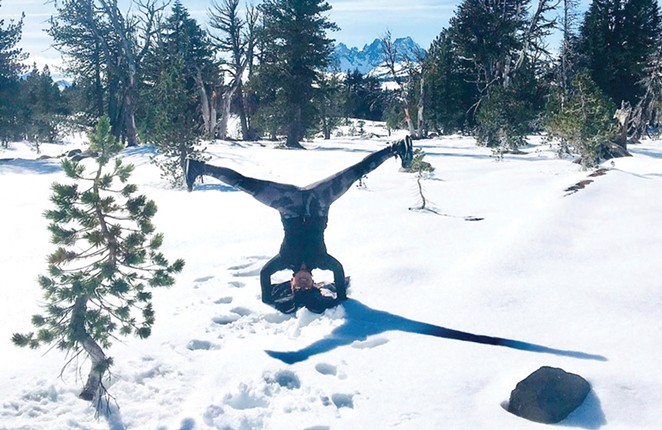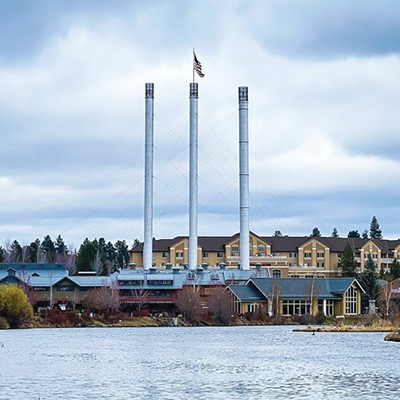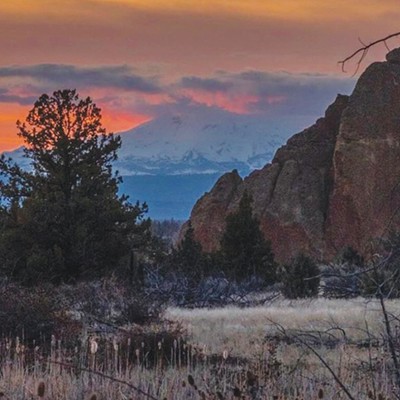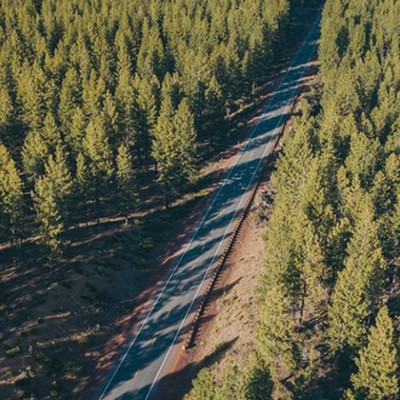
CORRECTIONS:
In last week's article "Hunnell Road Under New Camping Codes" we incorrectly said campsites were being cited under new city codes governing outdoor camping on City rights of way. Camps across Bend are being given notice to modify their campsites, which can theoretically end in a citation to municipal court. However, none have yet been cited. We regret the error.
Guest Opinion: Prescribed Burns:
Why and How
By Rod Bonacker, DCFP
Prescribed fire is the most cost effective and environmentally sound method of restoring and maintaining our forests and protecting Central Oregon communities from inevitable damaging wildfires. The mid-elevation pine/juniper forests and shrublands that most of us in Central Oregon call home evolved with and are dependent on fire for their continued health. Tree ring and fire scar research shows that fires burned through any given Central Oregon pine forest on an average of every 15-20 years prior to our history of significant fire suppression efforts. The first inhabitants of Central Oregon were well-aware of the role that fire played and used it intentionally to maintain their traditional food sources. Although disturbance methods like thinning, logging and hand clearing can reduce competing vegetation and forest fuel loads, frequent fire has many other positive, beneficial effects, including restoring animal and plant habitat, exposing bare soil for seeds, and breaking down woody debris into soil components that would otherwise take decades to decompose.
Prescribed fire usually means the intentional application of fire under a prescribed set of weather conditions (primarily temperature, relative humidity, wind speed and direction). Terrain, and vegetative fire fuel loading components are also included in the prescription development. Prescriptions, developed by fire managers, meet specific objectives. Reducing fuel loads and decadent shrub and grass populations, and thinning small trees, without causing excessive damage to the desired elements, are the most common goals. The amount of smoke produced and the impact on neighboring communities are also key considerations. Fire managers look for days that are predicted to have light surface winds with stronger winds aloft that will carry smoke away from sensitive areas.
Once the requisite conditions are predicted to occur, implementation of the burn can proceed. Preparation can start days before a burn. It usually includes building control fire lines, which could include improving roads or trails, removing snags along the control lines for the safety of the burn personnel, pre-treating fuels adjacent to control lines with water or foam. Fire-fighting resources are positioned on-site to prevent any possible fire escapes.
The actual lighting of a prescribed fire is both art and science. Usually beginning on the upwind side of the burn unit, lighters typically use a drip torch that dribbles a mix of gasoline and diesel fuel onto the forest floor. Lighters ignite strips perpendicular to the wind direction and allow fire to move back into the wind. This keeps flame lengths and intensity lower and creates a strip of burned fuels between the active fire and control lines. Since weather can be unpredictable, fire-fighting resources are prepared to halt burns in the case things deviate from the prescription.
Lighting stops, and new control lines may be constructed to stop burn progression. When all goes as planned and ignition is completed, burn units are closely monitored by fire managers to prevent re-ignitions or escapes. Actively extinguishing a burn or portions of a burn is occasionally done when pending fire danger warrants, or large fuels continue to smoke and impact the neighbors. However, comprehensive mop-up is expensive, ties up fire-fighting resources, and can have significant adverse impacts on soils and the forest.
— Rod Bonacker is a retired special projects coordinator for Deschutes and Ochoco National Forest. He began his Forest Service career in 1974 as a firefighter, and continues to work in fire suppression as Operations Section Chief for the Central Oregon Incident Management Team. He is a valuable member of the Deschutes Collaborative Forest Project. Rod loves to fish, ski, ride his bike, and manage his rare book business, Black Butte Books. For more information on DCFP go to: deschutescollaborativeforest.org.
Earth Month
In the spirit of Earth month and making ways to honor Mother Earth through consumption habits, I would like to give a huge shout-out to some local businesses that are making it a whole lot easier to minimize plastic use.
Locavore, located in Bend just off of Third Street, now carries Wallowa Valley Cleaning products in bulk. This product line includes liquid and powder options for dishwasher and laundry soap, as well as liquid household cleaners, dish soap, hand cleaner etc. which you can refill with your own containers.
Locavore also has a lot of other bulk buying options for food, and they carry locally made shampoo and conditioner bars that have made me a lifelong convert to never buying another plastic bottle of shampoo.
Other local business that I like to support for bulk food purchases are Market of Choice, Food For Less, and The Pantry, which is in the old Devore's location. At The Pantry one can get bulk refills for things like body lotion, witch hazel, toothpaste tablets, as well as dish and hand soaps, not to mention some of the most creative pastries in town.
Please consider making some lifelong habits to minimize adding to the already overwhelming amount of plastic that is choking our beautiful planet and consider supporting these great businesses for your food, household and body care needs.
— Bops Menefee
Letter of the Week:
Just in time for our Green Issue, Bops. Come on by for your gift card to Palate.
—Nicole Vulcan



















